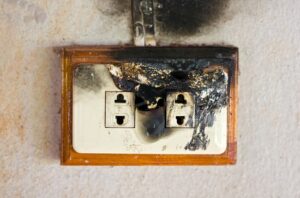 Do you know the basics of electrical safety? The United States Consumer Product Safety Commission estimates that there are 31,000 home electric fires each year. There are over 180 cases of electrocution and other electricity-related incidents that could be avoided. Home electrical safety is an important topic that should not be ignored. Follow these safety tips from electricians to protect your home, family, and yourself.
Do you know the basics of electrical safety? The United States Consumer Product Safety Commission estimates that there are 31,000 home electric fires each year. There are over 180 cases of electrocution and other electricity-related incidents that could be avoided. Home electrical safety is an important topic that should not be ignored. Follow these safety tips from electricians to protect your home, family, and yourself.
Electrician Tips: Safety tips for electricity
What can cause electrical fires in your home? According to the National Fire Protection Association, faulty or damaged wiring, as well as related electrical equipment, is responsible for 69 percent of all electrical fires. This is followed by lamps, light fixtures and cords, and plugs, transformers, and other power supplies. Always consult a professional when looking for fire hazards in your home. Electric Safety Tips for Your House Make sure you are using the right wattage for all of your appliances and fixtures. The right bulbs will prevent electrical problems, according to Myrtle Beach electricians. Make sure you check all fixtures, lamps, and appliances for the correct wattage. Use 60-watt bulbs for light fixtures that do not have a wattage. For unmarked ceiling fixtures, choose 25-watt bulbs. To protect your home, be aware of overloaded outlets. Electrical problems are often caused by overloading an outlet. Make sure all outlets are clean and in good working order. These safety tips can be found at ESFI: Use extension cords and multi-outlet converters only for appliances. One heat-producing appliance can be plugged into one outlet at a given time. Qualified electricians should inspect hot outlets. Power strips do not alter the power that an outlet receives. They only add outlets. Smart plugs can monitor the power load of outlets and shut down appliances if they overheat. To keep your home safe, replace or repair any damaged electric cords. Damaged power cords can create a risk to electrical safety to your home. They can lead to electrocution or fire. Every power cord and extension must be inspected for cracking or fraying and should then be fixed as required. You must not staple power cords or let them to run underneath the rugs and furniture. Overheating cords could lead to overheat wires and tripping hazards. Cord insulation could be crushed by the furniture and then lead to damage to wires. Extension cords can be used on a regular basis, so you may not have enough outlets. Install additional outlets in areas where extension cords are used frequently by a qualified electrical contractor who is familiar with electrical safety rules. To prevent damage, keep your unused and used cords neat and secure. The safety rules for electrical cords are not only applicable to those that are in use, but cords should also be kept secure to avoid any damage. Keep children and pets away from them. Avoid wrapping cords around any objects. This can lead to the cord to stretch or overheat. To prevent damages to the insulation or wires, never place a cord on a hot surface. To reduce the risk of potential fires, unplug all appliances that are not in use. Unplug an appliance when it is not being used. This is one of the most fundamental electrical safety tips. This will save power and reduce phantom drain, which is the amount of energy a device uses even when it's not in use. Unplugging appliances that aren't being used protects them against overheating and power surges. It can be difficult to remember to unplug appliances that are not in use. However, the new generation smart plugs offer a solution. They allow you to create power schedules for each outlet. To avoid shock, keep electrical outlets and devices away from water. Water and electricity do not mix well. Electrical safety rules require that electrical equipment must be kept dry. This will prevent damage to the appliances, as well as protect you from electrocution and personal injury. It is important to use electrical appliances with dry hands. It is important to keep electrical equipment out of reach from sinks, bathtubs, plants, aquariums, and sinks. This reduces the chance of electricity and water getting into contact. Make the necessary electrical repair as necessary.Call MB Electrician Pros now if you need help with electrical repairs.
MB Electrician Pros Myrtle Beach, SC 29577 843-353-6345 electriciansmyrtlebeach.comhttp://electriciansmyrtlebeach.com/do-you-need-electrical-safety-tips/

